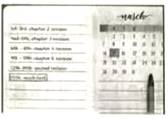Studying is not always the most interesting task within your day, but it is a necessary one. Even though it is required, everyone has got bored at one time or another while studying. Although this is a common problem, here are some tips for you to keep boredom away while you are studying.
Find a suitable place to study.

Make sure you are in a place that is free of distraction(分心). Distractions will actually cause you to become more bored because you are reminded of the things you could be doing other than studying.
Make a ▲ plan.

Plan first. List what you need to get completed and how long you need to complete it. If you know when you can go back to play sports or talk to your friends, you will be more likely to fix your attention on studies.
Mix up your topics.

Change up the topics that you are studying. Mix up what you study every half an hour to an hour or so to avoid boredom. For example, study history for 45 minutes, maths for 45 minutes, and English for 45 minutes. Make sure you don't spend all your time on one subject.
Take notes as you go.

Take a notebook out and write down important notes while you are reading an article in a textbook. Not only will it help keep you engaged, you will also be learning more because you process the information once as you read it and then again as you synthesize the information to write down.

